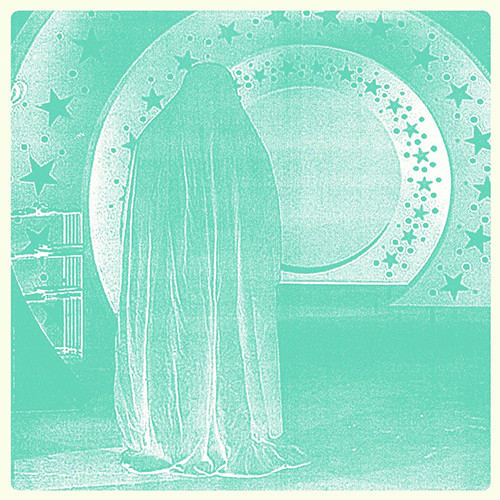Reviews
March / April 2013
Looking Like A Good Year ...
March was an incredible month for new material with plenty to enjoy, including comeback records from David Bowie, Suede and Crime & The City Solution, and a few oldies repackaged and redelivered. April was a little quieter, but with some nice releases from both new and familiar bands and the year continues to grow in promise. Remember, we have no interest in reviewing every new release; we only want to highlight anything of interest we feel you should be taking seriously. If you don't know a band, why not give them a go? Treasure is there to be unearthed and there is treasure to be found ...
Hookworms - Pearl Mystic
Gringo
Released: 4th March 2013
It has been a very long time since a British band made psychedelic rock music appealingly accessible; you would have to go back to Loop's early days to find anything that lifted the genre out of the narrowest of niches, and if you were going to bet on anyone to have managed to achieve this feat it probably wouldn't have been Leeds five-piece Hookworms. For some years this most elusive of bands have been doing virtually everything they can to avoid any sort of recognition, dribbling out a ludicrously limited series of home made releases, refusing even to reveal their names, and turning their backs to the light while simultaneously creating major waves with every live performance they have undertaken. Now with Pearl Mystic Hookworms have truly emerged from the alleyways of obscurity with a record of such dazzling luminosity the band will find it hard to escape from its glare. Not that this is any sort of commercial gem; Pearl Mystic is a hard, bitter and confrontational release consisting of six tracks and three bridges over forty-four minutes, yet the band's ability to interweave their anger and despair with helplessly appealing melodies underscored by a sunny production gives the album a heart and approachability that cannot fail to touch you. Opening with the near-nine minute 'Away/Towards', Hookworms take exactly three minutes to emerge from their shells, their muffled howls then bursting into exposed
life and lashing out with barely surpressed fury while simulataneously enticing you into a sonic dreamland with a blisteringly reverberating chorus lit by a light keyboard refrain which leaves you thinking nine minutes is not nearly long enough. Vocally, unlike so many bands of their ilk, Hookworms make no attempt to bury themselves under their swathes of noise, singer MJ taking a prominent role in proceedings as he unleashes narratives of darkness and depression, creating a raw garage edge to the carefully formulated backing. 'Form And Function' shakes to his passion while the band responds with melodic backing vocals and a glorious submerged guitar solo. The slower paced 'Since We Had Changed' is the most retro-sounding number here, mantra-like swaying with whispered vocals leading into a spaced-out outro, but it merges into the furious blast of 'Preservation', its distorted, largely indecipherable vocals for once taking second place to the enveloping sonic storm. Final track 'What We Talk About' is also more measured, again making fine use of a backing chorus, with bridge 'iii' dragging Pearl Mystic to a fitting droney conclusion. Get hold of this abum before it disappears into the ether like all other Hookworms releases; it's a dog of two heads, biting yet appealing, and it deserves to be heard.
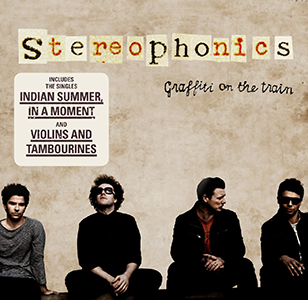
Stereophonics - Graffiti On The Train
EMI
Released: 4th March 2013
It is some sixteen years now since Stereophonics burst on to the scene with the absolutely blinding single 'Local Boy In The Photograph' and underlined their potential with the mightily impressive second album, Performance and Cocktails. Their story after that landmark release largely centres around the band's depressing transformation into stadium rock bores, with their music assuming appropriate blandness and the use of their name sounding more like a career path than a group with anything vital to say. As their popularity has waned a little over recent years, Stereophonics have showed some signs of returning to their alternative roots, and their first album in three and a half years is far from the car crash some would have you believe. If you can ever use the expression 'grown-up' in a good way, then this is as good a moment as ever. Kelly Jones has always had a great rock voice, but it is clear from Graffiti On The Train that his songwriting has matured enormously and there are some lovely little touches in these songs that lift them far above the mean. There's some latter day Oasis about the charging 'Catacomb' with a nicely messy build to its climax; there's a pleasing unconformity to the chameleon-like 'Roll The Dice'; and more than a bit of an edge to the burgeoning 'Violins and Tambourines' and the throbbing 'In A Moment'. Yes, there are strings draped all over these songs; yes, there are some strategically placed horns; and, yes, there's a even blues number. But they are all done well, and that's the crucial point. Stereophonics are no Rolling Stones and no Doors, but Jones does not sound out of place with his maudlin howl on 'Been Caught Cheating' and even the Fleetwood Mac guitars on 'Take Me' come over as classy rather than sickening. There's too much going on here to dismiss Graffiti On The Train lightly and enough of an edge to keep it out of the middle of the road. Sure as hell this record won't change your life, but there will be moments when it will do just nicely thank you. With no intention of sounding mean spirited, Graffiti On The Train really isn't crap.

David Bowie - The Next Day
RCA
Released: 11th March 2013
From 1969 to 1980, the series of albums David Bowie released (at the rate of one a year) was of unimaginable quality and must stand as the most consistently excellent run of recordings any rock artist has ever made. Over the rest of the eighties he released four albums of such intellectual and musical poverty it was difficult to believe they had been produced by the same man. From 1991 to 2003, realising what he had done, Bowie tried to make amends for this shameful lapse but, despite some interesting projects, largely failed to recapture the magic of his halycon days and when he disappeared from the public eye in 2003 following a heart scare, it seemed that his amazing musical career had come to an end. After nearly ten years of silence, however, the artist formerly known as David Bowie revealed a new single, the maudlin 'Where Are We Now?' on his 66th birthday and the news of a coming album had the senses tingling in that old, familiar way. With the cover artwork harking back to 1977's
Heroes, this futher whetted the appetite, forging a clear link with the time the man was at the height of his powers and the mere suggestion he could release something as appalling as
Never Let Me Down would have had you laughed out of town. There were two ways this could go:
The Next Day would prove to be the return to form for which we had prayed, or it would again fall short of the mark, earning a sympathetic four stars (or eight out of ten) from every music magazine to go along with their twelve page features on the man to which he would not have contributed a single word.
First of all, don't be fooled by the cover. The Next Day owes nothing musically to Heroes, though lyrically in places it may touch upon the Berlin era. It also owes little to any of the other classic albums namechecked by its contributors over the past month or two. This record lies far more comfortably with Bowie's four or five previous outings, though at its best it does has moments that throw up memories of Lodger, most especially when the welcome bursts of guitar dominate such as in the positive opener 'The Next Day', and the grinding 'Love Is Lost'. Elsewhere 'Valentine's Day' could have been tucked in nicely on Hours, 'If Can See Me', with its familiar drum and bass backing, on Earthling, and most of the other tracks on Heathen or Reality. Despite all of producer Tony Visconti's claims, innovative it ain't, and the Bowie able to reshape his sound into something new on every release is obviously a thing of the past. That said, The Next Day does have qualities of its own and it is clearly the most positive statement Bowie had made for any number of years. There is an energy and even playfulness about this record that is quite refreshing, injecting such numbers as 'How Does The Grass Grow?' with a vibrancy that makes it clear the singer has refound a zest for his craft. Even 'You Feel So Lonely You Could Die' manages to pass the test despite sounding like a cross between 'Rock 'n' Roll Suicide' and Mud's 'Lonely This Christmas' and concluding with the unmistakeable drum pattern of 'Five Years'. The biggest down side is that the backing is too big, too layered, and too predictable, often fighting the vocals, and a much sparser sound would have suited better. After all, take the voice out of the equation and there's not a lot left; Bowie has had no Ronson or Eno to shape his dreams for over thirty years. And though a resident of the world, Bowie remains quintessentially English and sounds so wrong singing the grating 'Boss Of Me'.
The Next Day is crying out for more innovation in its musical approach; the songs are way too conservative and unleashing the odd burst of guitar appears to be Bowie's only answer. Despite his marauding through most musical styles over the years, Bowie has never embraced the alternative scene with any enthusiasm and that is a disappointment. What wouldn't we give for the man to buy a flat in England and map out a record with Gemma Thompson and Ayse Hassan of Savages, or even the reanimated Jah Wobble and Keith Levene? The Next Day does have a lot to commend it, but it doesn't cross boundaries and doesn't challenge enough. It's thoughtful, crafted and in places bloody good, but it's not enough for Bowie to be the curate's egg: anyone can do that. From the man, we want more.
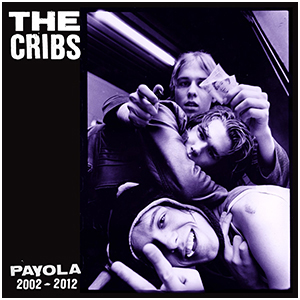
The Cribs - Payola
Wichita
Released: 11th March 2013
Has it really been ten years of The Cribs? Of all the bands in the world, you would have thought a retrospective from the Jarman brothers less likely than sunshine in March, an enduring career by definition at odds with the band's tumbledown and, in the early days at least, distinctly laddish approach. But here we are, five albums down the road with a twenty-two track shufty at The Cribs' best moments and a decent article it is too. Indeed, grab the 'deluxe' version at a very few more pennies and you get an extra disc of (largely) b-sides containing another eighteen songs, making a total of forty for less than a tenner and that's a pretty decent return. With three tracks from The Cribs, four from The New Fellas, five from Men's Needs, Women's Needs, Whatever, four from Ignore The Ignorant, five from In The Belly Of The Brazen Bull, and a bonus of the last track recorded with Johnny Marr before his departure from the fold, a pretty decent overview of the band's history is presented, with clear signs of the progression the band made in that time. How can you fail to thrill to the rush of the early tracks with their haphazard vocals, squealing guitars and studio asides, all underpinned with glorious melodies and an unsated lust for life? How can you fail to warm to the growing confidence and assurance revealed in the utterly addictive 'Man's Needs', the frantic 'Our Bovine Public', and the brilliant 'I'm A Realist' with its unforgettable lyric, "I'm a realist, I'm a romantic, I'm an indecisive piece of shit"? And how can you fail to admire the warmth of such later numbers as the almost delicate 'Anna', the menace of the crawling 'Back To The Bolthole', the sheer enormity of 'Come On, Be A No-One', or the punk frolic of 'Chi-Town' with its magnificent "Woo!"? The Cribs' approach may have been shambolic at times, their recordings haphazard, but they have always been a life force, always lived for the music and always looked to evolve and improve. There's not many bands these days who survive ten years in the field, and fewer still who remain as relevant after that time as when they first appeared. And there's not many who would have titled a song 'Glandular Fever Got The Best Of Me'. Five albums and now a retrospective: The Cribs are in danger of becoming national treasures.
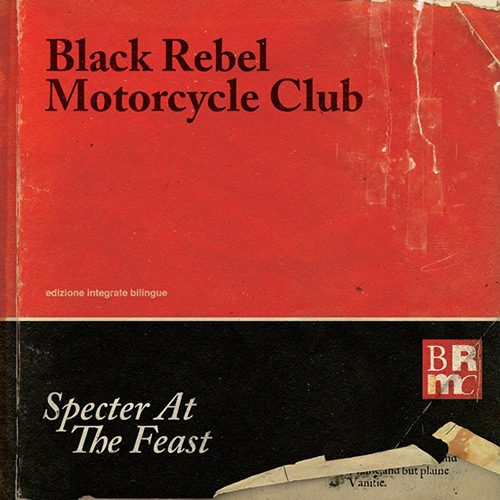
Black Rebel Motorcycle Club - Specter At The Feast
V2
Released: 18th March 2013
Three years and nine days after the release of Beat The Devil's Tattoo, BRMC return with their seventh studio album, apparently rejuvenated after taking a long rest from incessant recording and touring commitments. Whereas their previous offering was dark and unrelenting, the release of the single 'Let The Day Begin' last month saw the band adopting a lighter approach, the song a pounding, glam stomp with quite celebratory guitar riffs. A cover version of a song originally recorded by The Call, this also gives the answer to the story behind the new collection's title, the Banquo in question being Michael Been of that band, the father of Robert, who was BRMC's mentor and who sadly died in August 2010. Dedicated to the man who played on and produced their previous records, and whose spirit was clearly present in the recording studios, Specter At The Feast lyrically maintains an aura of reminisence and regret, though musically it swings from joyful swaggers in the same vein as the single, to mournful laments and furious, grinding rockers.
Indeed, it fittingly tips a hat to every style the band has embraced over the years, ranging from a whisper to a howl, a true feast in the sheer variety on offer, with just under an hour of music over twelve tracks. And, at its best, it is blinding. 'Sell It' is a monster of a song, building from its edgy, rumbling intro with withering guitar asides into a furious roar through the underworld as the souls of a thousand lost guitars make a vain bid for freedom. It's exhilarating and just one of a number of stand-out rockers. The storming middle section of the album offers the wordy 'Hate The Taste' with its big T. Rex breaks, the heavier 'Rival' powering along in more traditional BRMC style, and the heavier still 'Teenage Disease' which is brutally messy with a nicely incontinent solo. Add to that 'Funny Games' with its huge bassline, upliting refrain and rampant outro and BRMC have demonstrated no little will to fight. But this album is not all fury. The opener 'Fire Walker' is an absolute beauty, atmospheric and dangerous with its grinding bass backing, threatening to run riot and tear you apart but ultimately remaining content to flicker wickedly at the very edge of your vision. 'Returning' is an affecting lament, 'Sometimes The Light', a keyboard-drenched hymn and 'Lullaby' borders on psychedlic country. A mixture, then, and a decent one. Most albums this length are in need of some judicial pruning. Not this one. Wallow in the feast.

Suede - Bloodsports
Suede Ltd
Released: 18th March 2013
We were delighted to hear Suede had reformed and that new material was being written; their disappearance from the scene had been more of the whimper variety than the bang, with the poor
A New Morning meeting a deservedly apathetic response on its release in 2002. Now some ten and half years later (bloody hell, is it really that long?) the original 'Best New Band in Britain' has offered up
Bloodsports, a ten-track forty minute collection housed in artwork that hints back more to the glory days of the stunning
Coming Up than the patchy
Head Music of 1999 or the weak final release. The reformed band is, of course, Suede Mark II, with Richard Oakes on guitar instead the enigmatic Bernard Butler, and Neil Codling on keyboards, and though Butler would be a loss to any band, Oakes has always been a prodigious talent in his own right and helped lift the band to a different sphere on his recruitment to the fold.
Pleasingly, Oakes shows on Bloodsports he has lost none of his creativity, unleashing torrents of swirling and uplifting guitar tracks, which as much as Brett Anderson's distinctive vocals define what is unmistakeably the Suede sound; the sole reaction to the first listen to Bloodsports being that this is definitely a Suede album. And it's one hell of a slow burner. Whether absence from the arena has detuned the ears to their sound, or the lack of glam anthems here makes them less immediately accessible, initial thoughts turn to whether this is simply Suede-by-numbers and lyrics such has, "Her touch is like a raven's shadow," do little to lift the doubts. Yet, on repeated plays, Bloodsports proves to be insidious and before long you are completely immersed in the splendour of it all, and even tracks such as 'Hit Me' which really do sound like they have been lifted straight off earlier works begin to taste like the best medicine in the world, with familiar "la, la - la, la, las" and Oakes's simple, but naughtily buzzing solo. This, of course, means that the better tracks, which offer something new, sound even more impressive. Opener 'Barriers' builds slowly but soars to freedom, while 'Snowblind', the song most closely related to the Coming Up approach, is a bit of a stormer, with Oakes and Anderson in full flow, something that can't fail to impress. That Oakes manages to sound so vital here just makes you wonder what he was going through his mind when he recorded his not-very-envigorating recent solo album. 'It Starts and Ends With You' continues in the same vein, with lovely changes of pace, and Anderson's phrasing immaculate, while of the slower numbers 'For The Strangers' sees Oakes at his teasing best, dressing Anderson's vocals in delicate layers. Not that Oakes and Anderson are all that is happening here; Bloodsports has been given a very rounded production which leaves none of the band in the shade and Codling's contribution is far from insignificant, spreading the glue which holds the whole album together, underpinned by the steady work of bassist Mat Osman and drummer Simon Gilbert. The trio excel on the epic 'Sometimes I Feel I'll Float Away' as Bloodsports concludes in a far gentler manner than it opens.
There's little doubt that things are changing, and the re-emergence of guitar bands is the answer to unending prayers. That one of the best guitar bands of the independent era have returned is something to applaud, and that they have returned in such fine fettle is heartwarming indeed. Bloodsports certainly does the business, but you may need to give it a chance.

Crime & The City Solution - American Twilight
Mute
Released: 25th March 2013
Another welcome return after twenty-three years is that of Crime & The City Solution, reconstructed by singer Simon Bonney in 2011 in Detroit, with just violinst Bronwyn Adams, guitarist Alexander Hacke and the man himself remaining from the band's last Berlin incarnation. A successful tour last year served as showcase for American Twilight with the new songs sounding powerful in a live setting, and Bonney's voice still able to dominate over two guitars, bass, violin, keyboards and drums. Add some horns to the equation here and it's not surprising this record is musically dense with one hell of a lot going on the background. It's a huge contrast to some of the band's earlier recordings in which there was plenty of space for Bonney to work his magic; the sparseness of some of the accompaniment on 1988's majestic Shine putting it among the most affecting albums ever recorded. Here, the singer is not only competing with a potentially overpowering backdrop, but the American approach naturally gives this collection a more traditional rock sound than any of the previous recordings, and it comes as a blessed relief that Bonney's inate complexity manages to infuse the record with enough edge to lift it above its inherent limitations to create something that is truly subversive: a sound that is reassuringly familiar yet imbued with undercurrents of terror that keep you looking nervously over your shoulder. 'Domina' is case in point with its weeping western guitars, fiddle and hymn-like choral backing; it is unsettling enough before it builds through a huge guitar break into an obsessively disturbing conclusion like a pagan rite of passage in virgin fields. 'The Colonel (Doesn't Call Anymore)' prolongs the mood of unease with its barely formed guitars giving the singer room for manoeuvre, allowing for Bonney's strongest vocal, and which concludes with a scratchy, uncertain outro before 'American Twilight' goes straight for the jugular, sounding like a bastardised Rolling Stones, with everything thrown into the mix including a disturbing warning of "Armageddon coming to the city of fun." The nicely wordy 'Streets Of West Memphis' with its delicate accompaniment and Bonney's unistakeable inflexion closes proceedings with the repeated refrain of "here comes the rain", leaving you with the uncomfortable feeling this is not a good thing at all. Bonney talks of 'cautionary tales' on American Twilight and it is not easy to miss the shadows flickering at its periphery: a dream turned sour; stagnation; disaster on the horizon – all wrapped up in traditional forms ever so slightly falling apart at the seams. Yep, it's clever stuff and decidedly refreshing. In these unhappy days we need our visionaries and we need our mavericks; Bonney is both and again has shaped an album sounding like no other on earth. And what more can we ask of anybody?
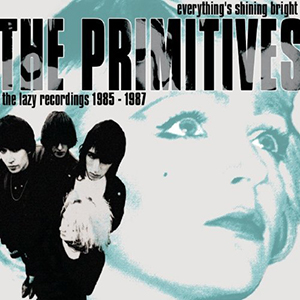
The Primitives - Everything's Shining Bright
Cherry Red
Released: 25th March 2013
The beauty of independent music is that there is always room for the have-a-go approach as well as for the innovative ground breakers; let's face it, punk was built on the DIY ethos as well as furnishing us with some of the most visionary and explosive artists the world has seen. The Primitives, from Coventry, were of that ilk, their recordings for the Lazy label not being the most sophisticated the world had seen, but full of charm in their tumbledown enthusiasm and offering an outlet for those who could often take their music far too seriously. Of course, they would eventually move on to RCA and take the charts by storm with the imperious 'Crash' in 1988 and fall from grace as their music became more refined, but for two years before that landmark release, The Primitives would record a series of exhilarating singles for the label started by their manager which are here gathered together not for the first time. Indeed, Lazy themselves initially knocked up a similar compilation in 1989 and the first disc of this 2CD set follows its track listing exactly with the addition of 'Ocean Blue', first seen on a seven inch single given away on tour, and six demos, some previously unreleased, and some live. There are eight more demos on the second disc, and it is interesting to hear early Lazy recordings of 'Crash' and six other tracks that were eventually to be re-recorded for the band's debut album Lovely on RCA. On top of this the second disc also contains the 14-track promo-only live album of the band performing at the ICA in 1987 (though this was previously included on the Sanctuary box set of 2008). In all, then, it covers the whole of the band's output on Lazy, some of which is admittedly painful to the ears, but other tracks of which are near-on essential listening. The original recording of first single 'Thru The Flowers' is stunning with its primitive rumbling bass and sawing guitars cut through by Tracy Tracy's unfluttered vocal. The more sophisticated re-recording released as a single a year down the line is equally as appealing, despite its refinement, revealing the song to be a gem in its own right, something the band would struggle to emulate in later years. Second single 'Really Stupid' is a likeable blast despite its huge upfront drums and barely audible bass, while 'Stop Killing Me' is equally as storming and more roundly produced with a fiery brief guitar solo and tiny bursts of feedback which seem to capture the spirit of the age. None of this will change your life, but the world would be a poorer place without it.
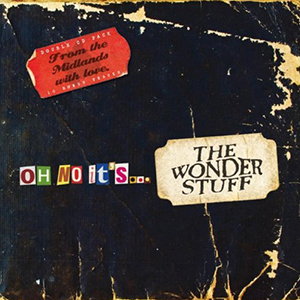
The Wonder Stuff - Oh No It's ...
IRL
Released: 25th March 2013
Another blast from the past, The Wonder Stuff were pretty major stars back in the late eighties and eary nineties, with three top ten albums to their name (four counting compilations). The snotty midlanders were not everybody's cup of tea as they released a series of in your face singles with an uncompromising outlook on life – "I didn't like you very much when I met you ... and now I like you even less" – but by the time they hit the top ten with 1991's 'Size Of A Cow', they had pretty much managed to charm all and sundry and even claimed a number one in the company of comedian Vic Reeves with a cover version of Tommy Roe's 'Dizzy'. The band split in 1994, but reunited in 2000 since when all of the original members have gradually dropped away, apart from singer and guitarist Miles Hunt who has written and produced eleven new songs on Oh No It's ... The Wonder Stuff which is released accompanied by a second disc of cover versions of songs originally written by bands from the Midlands. This is the third offering from the band since their resurrection and their first for seven years since Suspended By Stars saw light of day in February 2006, and it will come as no surprise that the older Stuffies are not half as spiky as their old selves, though on occasion there is a familiar ring to their approach. 'From The Midlands With Love' has the recognisable Stuffies' stabbing guitars, though the prevalence of the fiddle through most of the tracks makes any similarities closer to their later material. Most of the songs here are refined and harmonious, lacking any sharp edges, with Hunt clearly concentrating on his lyrical dexterity rather than making waves with his riffs. There are some nice moments. 'Yer Man's Alright' is catchy as hell, 'Oh No!' is bouncily appealing, and 'Steady as You Go' even has an Oasis thing going on. Of the bonus tracks, the band have a decent stab at Duran Durans' 'Planet Earth' and the Move's 'Blackberry Way', though attempts at covering Slade and Dexys fall a bit flat. Worst of all is the acoustic attempt at The Primitives' 'Crash' which should have been left well alone.
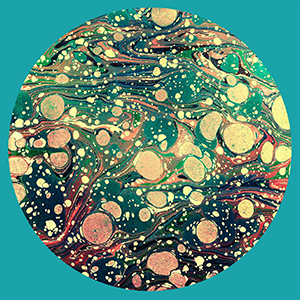
The Horrors - Higher
XL
Released: 25th March 2013
In this age of box sets, it is difficult not to be impressed by the attention to detail
that is lavished on some of the packaging and this collection from The Horrors is a stunning thing: four twelve-inch singles in marbled paper-style album covers with inner sleeves and a further album cover containing a card board holding a DVD and two CDs, all slipping nicely into a well-made inner tray which in turn slides into a easily fileable twelve-inch outer box. Apparently created because the band wanted to see twelve-inch vinyl releases of the singles from their rather good Skying album, the DVD contains the three videos of the singles while each single sits on a vinyl disc in its original form surrounded by various remixes of most of the album tracks from the likes of Andrew Weatherall, Andy Blake, Daniel Avery and others. All of the remixes are contained on the two CDs, along with three extras for which vinyl space could not be found. Now, we are not fans of remixes in any way, generally consigning them to the grumpy list along with downloads and list journalism, and these reworkings will force no change in our beliefs, the original tracks being totally unrecognisable after being torn to pieces and reconstructed. Um, if you want to make a completely different record, why not just make one rather than fabricate one? It remains a mystery. Of the videos, White Rabbit's direction of 'I Can See Through You' is rather a stunner in its wide screen format, while Oliver Murray's 'Still Life' has a good go with what is an unremarkable song, and Pete Fowler's 'Changing The Rain' in cartoon style doesn't really appeal in any sense. That track also remains one of the few not tackled by the remixers, being a bit of a dub in its own right, but still a stand-out number. Of the remixes, The Pressure Ridges' reworking of 'Dive In' is sensitive to the original and holds your interest, and Weatherall's take on 'Wild Eyed' also shows a lightness of touch, but elsewhere there is a lot of beeping, twanging and thudding with very little sense of empathy or belonging in an hour and half of over indulgence. Just goes to show, you can't judge a book by its cover.

The House Of Love - She Paints Words In Red
Cherry Red
Released: 25th March 2013
French novelist, art theorist and Minister for Cultural Affairs, Andre Malraux, died exactly a week before the Sex Pistols made their legendary TV appearance with Bill Grundy. When asked to sum up what he’d learned about the human condition, he quoted the words of an elderly priest, "First of all, people are much more unhappy than one thinks … and second, there is no such thing as a grown-up person." Early offerings from indie musicians, particularly in the 1980s, handsomely back up that first point, with entire oeuvres composed of different ways of saying "I suffer". The great acts transcended the anguish, the lesser ones stayed stuck in the mire. The House Of Love were a truly great transcendent act, taking the existential cry, "I don’t know why I feel this way" on 'Shine On', and soaring elsewhere with it. To go fancy French theory for a moment, they combined
plaisir, that’s to say familiar enjoyment, with
jouissance, a crazier, untethered sensation. Indie pop that went where indie pop didn’t usually go, thanks to the liquid light of Terry Bickers’ guitar.
And so to part two of Malraux’s thesis. Quarter of a century on from their inception, have The House Of Love tried to grow up, and has it worked? Is their new album any good?
Statisticians and completists will regard She Paints Words In Red as the sixth House Of Love studio album, whilst others may see it as the fourth ‘proper’ offering, given that two of those six didn’t feature the Guy Chadwick/Terry Bickers partnership. Whatever one’s leaning, it’s definitely the second release since they reconvened in 2005. And it’s a delight. It’s a plaisir rather than jouissance album, with little of Bickers’ reconfiguring of the sonic lansdscape, but that’s fine. It’s of a pastoral stripe, it recalls Stephen Duffy’s Lilac Time, Simon & Garfunkel, mid-period Kinks, at times jaunty, at times melancholic, anthemic in an acceptable way. Chadwick and Bickers have never sounded better together, which may be a problem for those who believe their friction was integral to the classic early material, but there’s now a wonderful sense of collaboration, dissolution of egos, as evidenced on the recent tour. Chadwick’s lyrics are reflective and contemplative, Bickers’ licks bang on the money. The final track, 'Plans', has a beautiful circular structure, with Chadwick’s refrain, "Plans, don’t they always change, nothing stays the same, everything we have is just a shallow grave, a world that can’t be saved", offset by a lovely, languid melody. Great stuff.
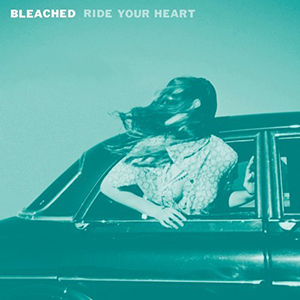
Bleached - Ride Your Heart
Dead Oceans
Released: 1st April 2013
With Cherry Red repackaging the early works of The Primitives, it seems only right that a new release has emerged which would have slotted very nicely thank you into the 'blonde' sub-genre invented by the music press at the time, and even more fitting the band in question should be named 'Bleached'. Comprising of Californian sisters Jennifer (guitar) and Jessica (bass) Clavin, the word 'punk' has been thrown around a lot in describing Bleached, not least because of the girls' former membership of the well known Mika Miko, but in truth the only aspect of this release justifying that epithet is the approach and not the delivery; their music sounding roughly like a combination of the Ramones and a sixties girl group, the twelve songs on offer being rudimentary at best, though not without a basic charm. Indeed, their sound is not far removed from that of The Flatmates or other denizens of the Subway Organization which blossomed in the late 1908s in West Country England, especially in some of the vocal deliveries. There are not many chords on offer here and the better moments are when they are played quickly, as in the charging 'Waiting By The Telephone', the jagged 'Dead Boy', and the chugging 'Searching Through The Past' with its valiant stab at a guitar solo. Elsewhere, lead track 'Looking For A Fight' has a bit of punch to it and doesn't sound a million miles away from early Fuzzbox, while 'Next Stop' has a bit of 1977 riffing going on and some fitting backing harmonies, and it all ends splendidly with 'When I Was Yours' dissolving into a messy climax. It doesn't all work well, and sure has hell there are no boundaries being challenged here, but play it loud as you drive along the coast on a Summer's evening and there won't be much wrong with the world.

Yeah Yeah Yeahs - Mosquito
Polydor
Released: 15th April 2013
It's ten years now since the Yeah Yeah Yeahs burst on to the scene with their dynamic debut album, Fever To Tell, later rated by the NME as the fifth best album of the decade. It was a nicely in your face affair, raucous, trashy and extremely self-aware, with frontwoman Karen O quickly becoming a common face on the leading pages of the music press. Since then the band has not exacly been prolific, the decent follow-up Show Your Bones appearing in 2006 and the less appealing, electro It's Blitz! seeing light of day in 2009. Just over four years later and the YYYs finally return with their fourth long player Mosquito, the cover of which with its slime covered typeface and comic book imagery hints that the band may have returned to their chaotic roots, though any thoughts of this are quickly dispelled with a first play of the album which turns out to be far from a feeding frenzy and about as adult as it comes. Indeed, the album opens in a pretty downbeat manner with the teasing 'Sacrilege' which creeps along before building into a gospel choir ending which sounds more like a farewell than a hello, and the desolate 'Subway', a five minute lament with trains rattling by. It's all pretty glum until the title track erupts in a welcome burst of noise, tapping into a much more familar vein, with Karen O shouting, "He'll suck your blood, suck your, suck your blood." It's a rare explosion of euphoria, matched by the silly garage thrash of 'Area 52', but on the whole Mosquito is more introspective than introvert, an accusation you never thought would be aimed at the YYYs. Not that this is all bad, or even depressing; there's a depth to these tracks which lifts them above simple morbidity, a nice dub edge to the grim 'Under The Earth', a slowly bubbling groove underneath the equally blank 'Buried Alive' and when Karen O begins to sing on 'Slave' and 'Despair' you'd swear it was Siouxsie Sioux in her 'Kiss Them For Me' period. It's a strange one, this, and a million miles from what we expected. A good blast of Yeah Yeah Yeahs used to blow away the cobwebs and now they seem content to hide away among them.
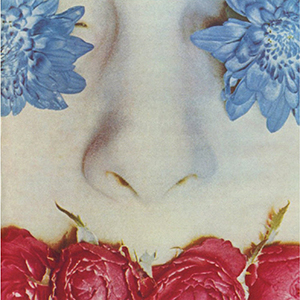
SULK - Graceless
Perfect Sound Forever
Released: 15th April 2013
It's been nearly seventeen months since we last heard from Sulk when they released two promising singles at the close of 2011, 'Wishes' and 'Back In Bloom', the former all shimmering guitars and autumn breezes, the latter a wistful sigh with tumbling harmonies and a soaring lead, the beauty of which only served to reinforce the underlying sorrow of the narrative. With such a promising start behind them, everything was looking rosy, which made the ensuing silence all the more confusing. Then, in the early part of this year it was announced that Sulk's debut album, coming in at ten tracks and 38 minutes, was finally going to see the light of day, and not a moment too soon. The lull in proceedings was apparently brought about by the band's need to find the resources to record the album on their own terms and, quite frankly, it was well worth the wait. Pleasingly, both of the early singles are included, opening up the second side, and even more pleasingly, Sulk have managed to reinforce these with a series of intricate, gorgeously melodic songs which blow by like lazy, long summer days. Opener 'Sleeping Beauty' chimes and sighs and is graced with a impressively shackled guitar break halfway through, download single 'Flowers' ebbs and flows in the manner of an early Blur number, while forthcoming single 'The Big Blue' is a more restrained affair with an anthemic chorus and the slightest of psychedelic infusions. Still it gets better; when Sulk inject a bit more fire into the proceedings the results are quite startling. 'Diamonds And Ashes' is a gem of a rocker and possibly the best moment on the album, the poignant 'Marian Shrine' rumbles along to a huge bassline draped in searing guitars as it searches for some rest for the soul, and 'End Time' crashes purposefully to a fitting conclusion. This album is a nice piece of work and it's a shame Sulk can't seem to breathe without being taunted about their obvious late eighties/early nineties influences. Yet the music they are reinvigorating is over twenty years old now, so how long does it have to be before something is allowed to influence you? Less time passed between Eddie Cochran and the Sex Pistols, though it may have seemed a world away, and Sulk are so much more than the music that has shaped them. There's some great stuff here and the future has got to be looking bright for them. The band are touring the album in May and June, so get along to see them wherever you can.
Reviews: Adam, House of Love: Andy Darling
Top photo: Sulk by Lilly Creightmore,
www.sulktheband.com
January/February 2013 Reviews
May 2013 Reviews

Isolation on Facebook. Like us.
Isolation contact

